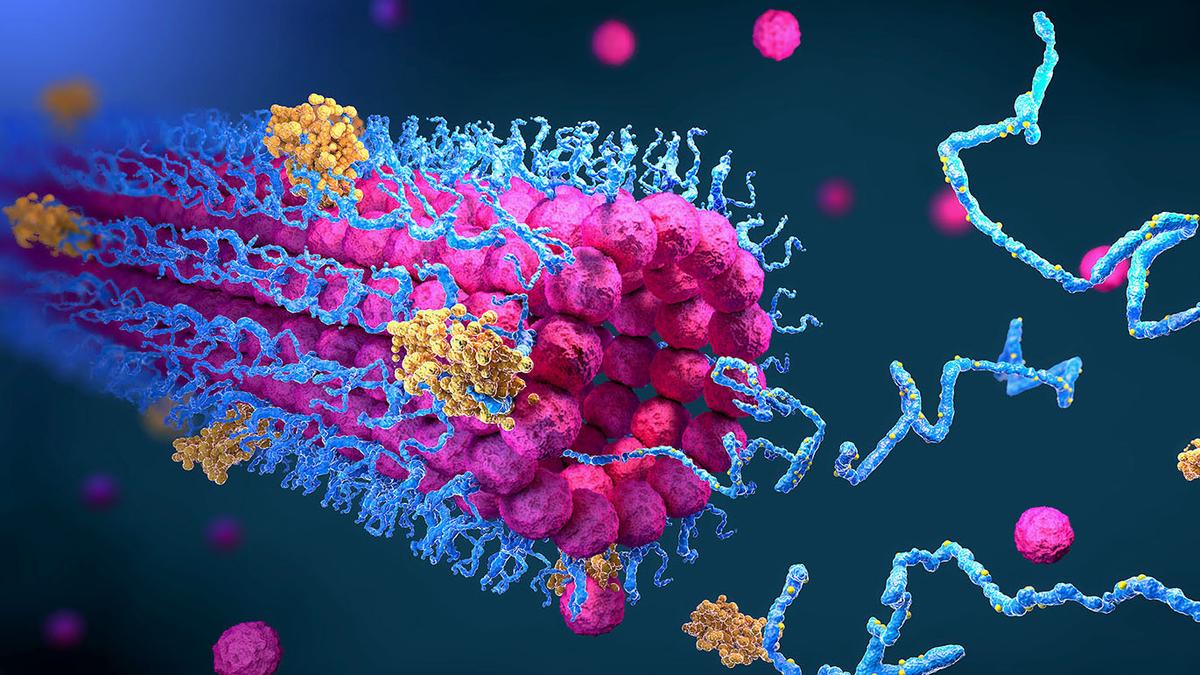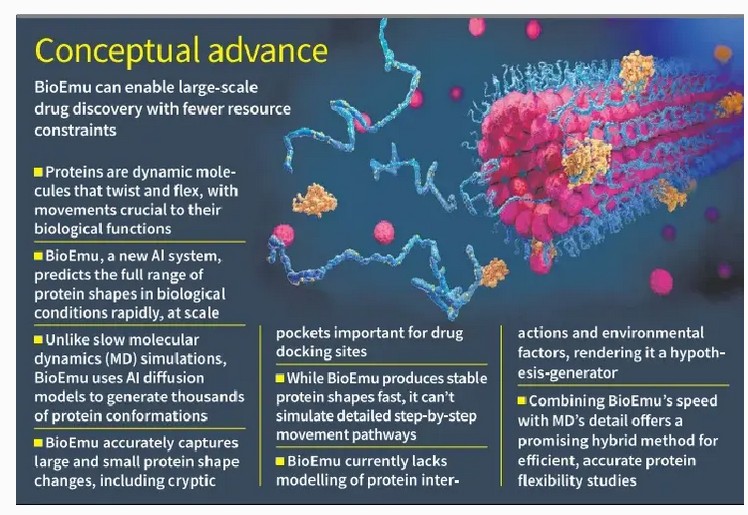



BioEmu is a deep learning system developed by Microsoft, that predicts the full range of shapes a protein can take under biological conditions. It aims to provide high-resolution models of protein flexibility at scale, accurately showing all possible ways, a protein can bend and move. Its broader implications include faster drug discovery, and personalized medicine.

Copyright infringement not intended
Picture Courtesy: THE HINDU
BioEmu is a new deep learning system, developed by Microsoft and researchers at Rice University in the US and Freie Universität in Germany, predicts the full range of shapes a protein naturally explores under biological conditions.
|
Proteins are large, complex molecules essential for the structure, function, and regulation of the body's tissues and organs. A protein's ability to move and change shape directly affects its function.
|
It is a new Deep Learning AI system, specifically a type of AI called a "diffusion model."
It focuses on predicting the entire range of shapes a protein can take under normal biological conditions. Scientists refer to this as the "equilibrium ensemble."
Goal => To provide high-resolution models of protein flexibility at scale; accurately show all the possible ways a protein can bend and move.
 How did BIOEMU learn its skills?
How did BIOEMU learn its skills?
Its "training data" includes structures from AlphaFold (another AI that predicts static protein structures), results from traditional Molecular Dynamics (MD) simulations, and information from mutant protein sequences.
Speed => Generate thousands of protein structures in just minutes or hours using a single GPU (Graphics Processing Unit).
Cost => Fast and requires less specialized hardware, which makes it cheaper than running classical MD simulations.
|
AlphaFold |
BIOEMU |
|
|
Primary Goal |
Predicts a single, most likely static 3D structure of a protein. |
Predicts the full range of dynamic shapes a protein can take. |
|
What it shows |
A static snapshot of a protein's folded state. |
A collection of diverse, probable movements and shapes a protein adopts in biological conditions. |
|
Use Case |
Understanding a protein's general form. |
Understanding how a protein performs its function through movement, crucial for drug targeting. |
|
Developer |
DeepMind (Google) |
Microsoft, Rice University, Freie Universität |
While AlphaFold provides the "blueprint" of a protein, BIOEMU reveals its "choreography" – how it moves and wiggles, which is essential for understanding how drugs interact with it.
Process vs Snapshots => Cannot show the step-by-step pathways or detailed transition states of protein movements. It provides final shapes.
Nature => A "hypothesis-generating tool", that provides scientists with a set of plausible ideas or shapes, but these ideas need further validation through traditional experiments or more detailed simulations.
Accelerated Drug Discovery => Cut down the time it takes to find new drug candidates, bringing new medicines to patients faster.
Personalized Medicine => By understanding individual protein variations and movements, AI could pave the way for highly personalized treatments as per patient's unique biological makeup.
Scientific Democratization => Reducing the cost and time for complex simulations makes advanced research more accessible to smaller labs and developing nations.
Must Read Articles:
BASICS OF ARTIFICIAL INTELLIGENCE
WHO ISSUES ETHICAL GUIDELINES FOR HEALTHCARE AI
Source: THE HINDU
|
PRACTICE QUESTION Q. Consider the following statements in the context of the BioEmu AI: 1. It is an AI diffusion model designed to predict a single stable form of a protein. 2. It is faster and cheaper than molecular dynamics (MD) simulations. Which of the above statements is/are correct? A) 1 only B) 2 only C) Both 1 and 2 D) Neither 1 nor 2 Answer: B Explanation: Statement 1 is incorrect: BioEmu is a deep-learning diffusion model that predicts a range of structural conformations that proteins can adopt, offering a dynamic view of protein behavior, rather than a single static structure. Statement 2 is correct: BioEmu offers higher computational efficiency, being orders of magnitude faster and cheaper than traditional molecular dynamics (MD) simulations. It can generate thousands of protein structures per hour on a single GPU, which would take weeks or years with conventional MD methods. |
BioEmu is a new deep learning AI system that predicts the full range of shapes a protein naturally explores under biological conditions, known as its equilibrium ensemble.
Cryptic pockets are temporary crevices on proteins where drugs can bind, and BioEmu can predict these fleeting conformations.
By quickly capturing protein flexibility across thousands of proteins, BioEmu enables large-scale drug discovery and function studies more efficiently.







© 2026 iasgyan. All right reserved